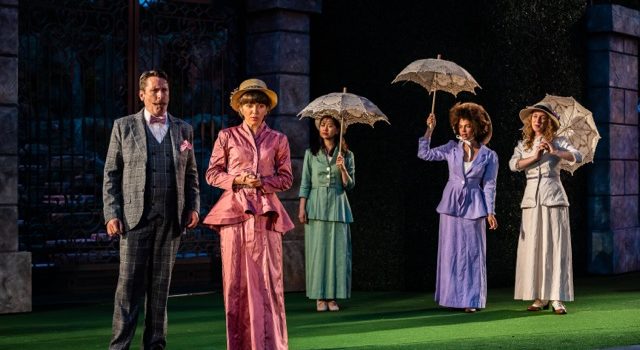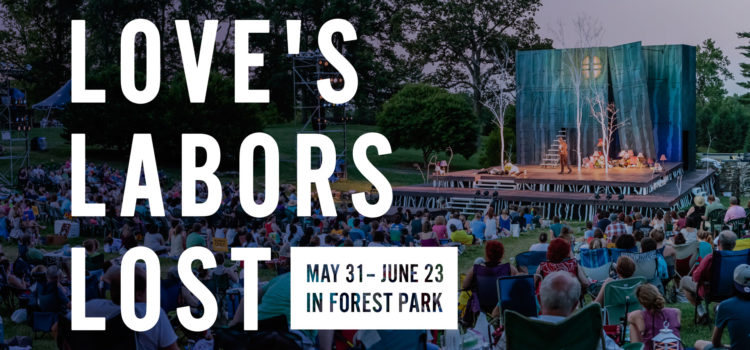By Lynn Venhaus
Your first clue that we’re not in Missouri anymore is the palm trees jutting out from a swanky home’s backyard pool and patio right here in St. Louis’ own Forest Park.
That au-currant set design by Regina Garcia tips us off that we’re being transported to the vibrant cultural confluence that is a Latin-infused coastal town, aka Illyria (nod to Miami), where romance, music and festive fun are priorities.
Funny, flamboyant, and even frivolous at times, “Twelfth Night” is given a fresh spin by St. Louis Shakespeare Festival that is ideally suited for the outdoor month-long production at Shakespeare Glen.
Considered William Shakespeare’s “greatest comedy,” it’s certainly one of his most accessible – and director Lisa Portes has set it in a modern celebrity-filled metropolis, creating vivid characters and a glitzy vibe.
Portes, who heads the MFA directing program at The Theatre School at DePaul University in Chicago, framed it as an exile story. Her father came over to America from Cuba when he was 15, during the Cuban Revolution.
It’s a tale of young Viola (Gabriela Saker) who is rescued after being shipwrecked, and she believes her twin brother Sebastian (Avi Roque) has succumbed to a tragic fate, lost at sea.

After separation, each has reinvented themselves, trying to find their way in a strange new world. Disguising herself as a male, “Cesario,” so she can work for soccer celeb Orsino, Viola discovers love at first sight with the affluent jock, now her boss – and is thrust into a poolside whirlwind journey.
For the most part, a crackerjack ensemble weaves a merry tale of mistaken identities with aplomb.
Scene-stealers Ricki Franklin, funny as the loud party girl Dame Toby (a gender switch from Sir Toby Belcher), and Cassidy Flynn, reminiscent of comic actor Charlie Day in his chaotic antics as Sir Andrew Aguecheek, are standouts. As the obnoxious ringleaders of revelry, they elicit shrieks of laughter from the engaged crowd.
Unfortunately, the cast was uneven early in the run (on June 2), and there are a few trouble spots (chalk it up to the demands of a large outdoor show?). Orsino is supposed to be a robust figure, yet Felipe Carrasco, who physically looked the part, seemed rather nondescript in the role.
Feste, the fool, is usually wacky on stage, and Esteban Andres Cruz is daffy in demeanor, but the downfall here was that they were flat and offkey singing some of the Latin-infused melodies, including a pitchy duet with Viola. However, they projected a flashy personality in the costumes designed by Danielle Nieves.
Nevertheless, the instrumental rhythms arranged by Music Director David Molina, including traditional Latin songs with contagious beats, was superbly performed by band leader Phil Gomez and Clave Sol (Gomez on piano, Tung on bass, Thor Anderson on Congas and Herman Semidey on timbales and percussion). Molina was the sound designer as well.

With such a glamorous setting, of course Nieves’ costumes would reflect a hot and hip attitude, and none more so than Jasmine Cheri Rush, who looks and moves like Beyonce.
Her comical outfitting of a lovesick Malvolio (a delightful Ryan Garbayo) is one of the evening’s biggest laughs.
Alisha Espinosa as Maria, Adam Flores as Fabian, and Christina Rios as Captain offer fine support as Olivia’s team (Rios also returns as a priest), while Adam Poss plays Valentine and Femi Aiyesgbusi is Curio, two of Orsino’s attendants. Poss also plays Antonio, who falls in love with Sebastian after rescuing him.
The coupling – Antonio loves Sebastian, Viola loves Orsino, Orsino loves Olivia, Malvolio loves Olivia, and Olivia loves Roderigo (aka Sebastian) – gets very complicated with the mistaken identities and unrequited love (which, if seem familiar, are plot threads copied from Shakespeare for centuries). It might be helpful to read the large graphics board set up on the grounds to explain the players and what happens.

As Shakespeare once wrote in another play, all’s well that ends well, and love is love – and indeed will eventually triumph in certain cases.
The sleek designs – John Wylie’s cool lighting really makes the set pop – amplify the culture and community for a most pleasant summer evening.
The expressed joie de vivre makes this one of the liveliest Shakespeare in Forest Park productions in tone and tempo, and its heartfelt message about acceptance and identity a hopeful takeaway.
St. Louis Shakespeare Festival presents the comedy “Twelfth Night” Tuesdays through Sundays at 8 p.m. except on Mondays, from May 31 to June 25, in Shakespeare Glen in Forest Park. (Across from the Art Museum). The grounds open at 6:30 p.m., and the show is 2 hours, 30 minutes, with an intermission. For more information, www.stlshakes.org.


Lynn (Zipfel) Venhaus has had a continuous byline in St. Louis metro region publications since 1978. She writes features and news for Belleville News-Democrat and contributes to St. Louis magazine and other publications.
She is a Rotten Tomatoes-approved film critic, currently reviews films for Webster-Kirkwood Times and KTRS Radio, covers entertainment for PopLifeSTL.com and co-hosts podcast PopLifeSTL.com…Presents.
She is a member of Critics Choice Association, where she serves on the women’s and marketing committees; Alliance of Women Film Journalists; and on the board of the St. Louis Film Critics Association. She is a founding and board member of the St. Louis Theater Circle.
She is retired from teaching journalism/media as an adjunct college instructor.



